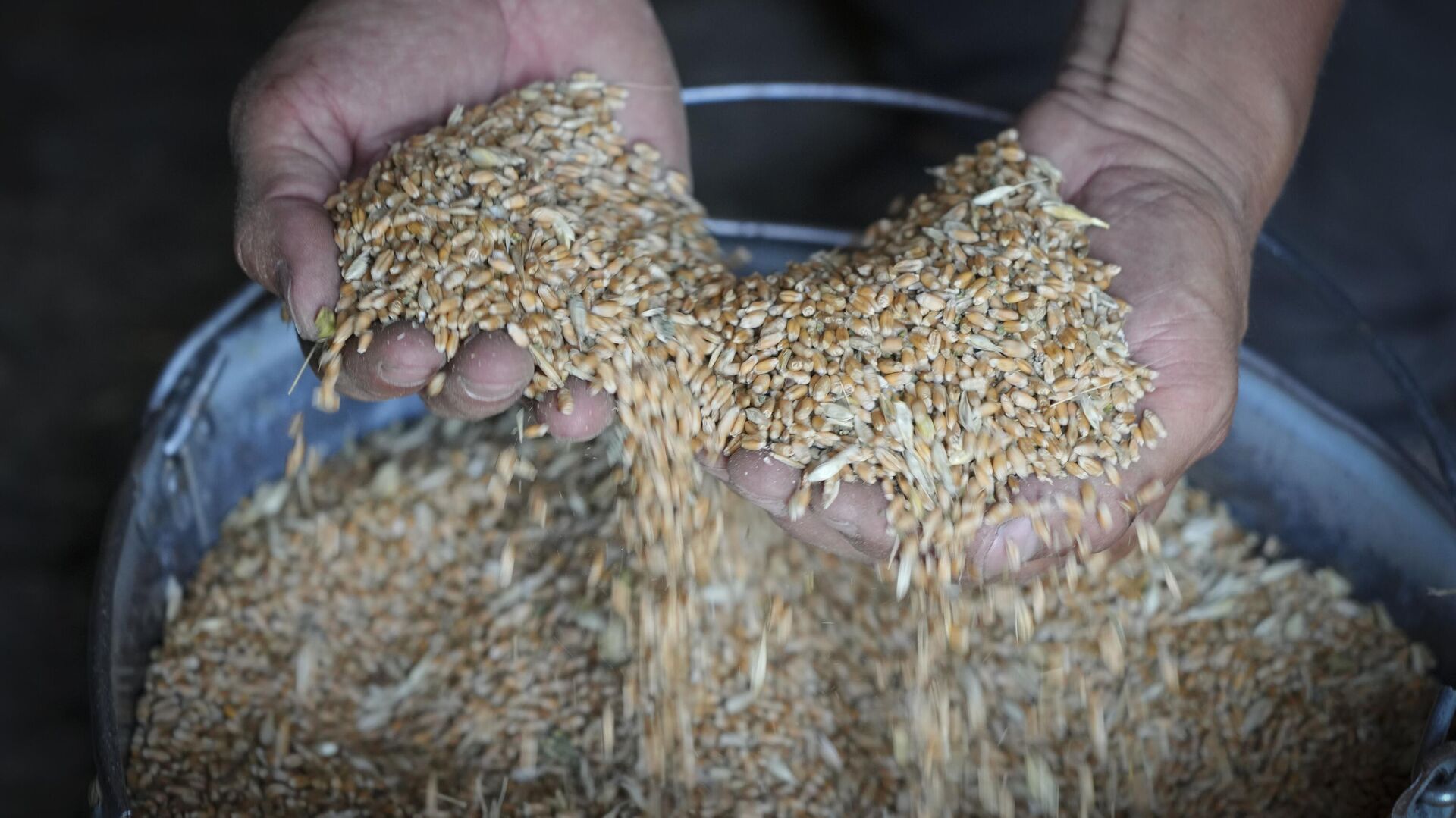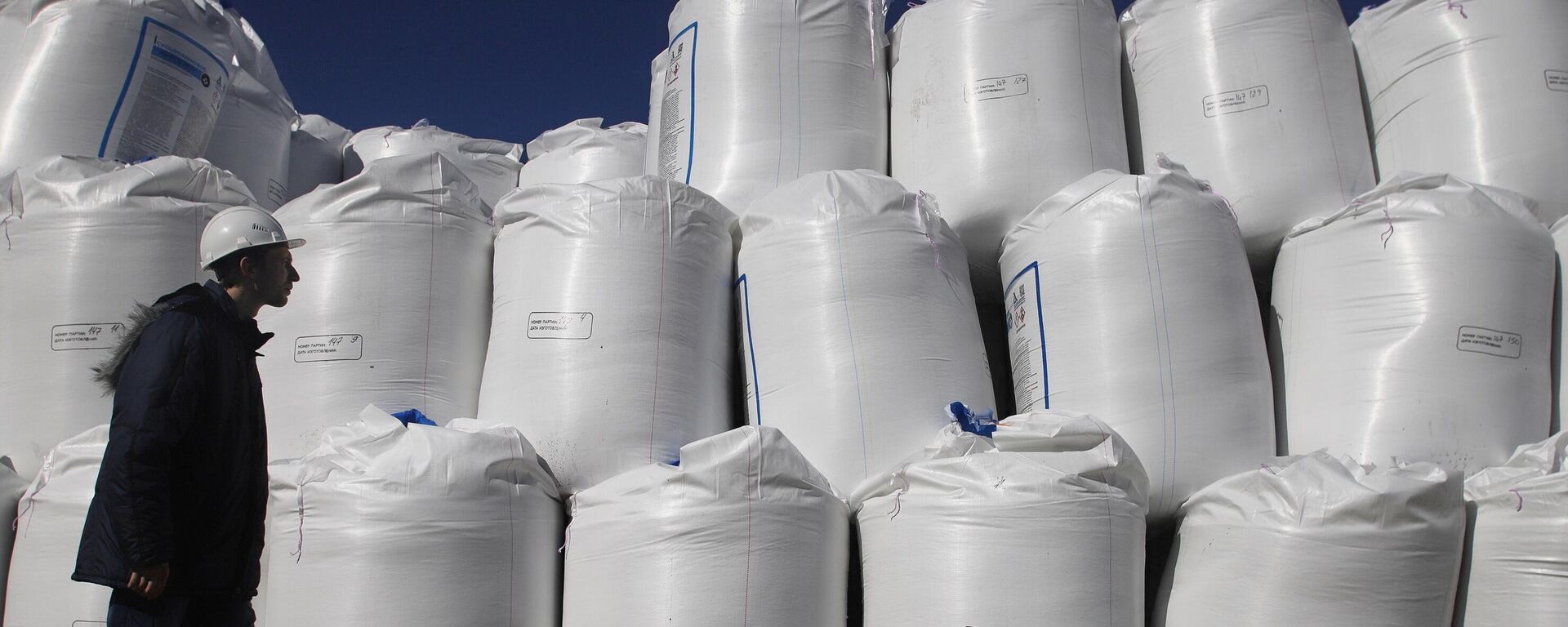https://en.sputniknews.africa/20230426/poland-wants-to-agree-import-bans-on-ukrainian-grain-with-eu-agriculture-minister-says-1058867387.html
Poland Wants to Agree Import Bans on Ukrainian Grain With EU, Agriculture Minister Says
Poland Wants to Agree Import Bans on Ukrainian Grain With EU, Agriculture Minister Says
Sputnik Africa
Poland intends to conclude a deal with the European Commission on restricting food imports from Ukraine and providing EU farmers with funding to mitigate their losses due to an influx of Ukrainian grain on the Polish market.
2023-04-26T15:15+0200
2023-04-26T15:15+0200
2023-08-03T10:48+0200
ukraine
poland
grain
grain deal
european union (eu)
europe
european commission (ec)
ukraine crisis
international
https://cdn1.img.sputniknews.africa/img/07e7/04/1a/1058867015_0:167:3051:1883_1920x0_80_0_0_7bd46d06c4f9527d9441cf2414c9a226.jpg
"I would like to have a good agreement [with the European Commission] to develop such mechanisms that will work for years, and not just today … to have such tools so that it [the issue] does not recur, so that the Polish farmer is confident that [Ukrainian] products will not flood our market and will not destabilize this market, as has been [the case] until now," Telus told Polish broadcaster Polskie Radio.Telus also said that he expected to obtain the EC's decision as soon as possible on providing assistance to farmers who suffered losses due to the influx of Ukrainian grain imports on the Polish market. The developments come against the backdrop of some European states' increased concerns triggered by the surge in imports of grain from Ukraine. This was set off by the duty-free trade agreement between the European Union and Kiev signed last June and the launch of so-called green corridors for transit of agricultural products from Ukraine to the world market in March 2022, which ended in cheap Ukrainian grain flooding EU markets, prompting outrage among local farmers.On April 20, Brussels proposed a mechanism to stop imports of Ukrainian grain, corn, sunflower seeds and rapeseed into the EU until June 5, in an attempt to support the affected EU farmers. Later on, six of the EU member states urged the European Commission to extend the ban until the end of 2023.On April 15, Poland and Hungary said they were banning imports of Ukrainian agricultural products until June 30, citing the need to protect domestic farmers from the uncontrolled influx of cheap grain from Ukraine. Slovakia followed suit on April 17 and Bulgaria on April 19.
https://en.sputniknews.africa/20230421/russia-preparing-supply-of-fertilizers-blocked-in-europe-to-kenya-nigeria-1058746575.html
ukraine
poland
europe
Sputnik Africa
feedback@sputniknews.com
+74956456601
MIA „Rossiya Segodnya“
2023
Sputnik Africa
feedback@sputniknews.com
+74956456601
MIA „Rossiya Segodnya“
News
en_EN
Sputnik Africa
feedback@sputniknews.com
+74956456601
MIA „Rossiya Segodnya“
Sputnik Africa
feedback@sputniknews.com
+74956456601
MIA „Rossiya Segodnya“
eu, ec, europe, ukraine, poland, grain, wheat, ukrainian exports, poland imports, grain imports, grain exports, european commission, grain market, polish grain,
eu, ec, europe, ukraine, poland, grain, wheat, ukrainian exports, poland imports, grain imports, grain exports, european commission, grain market, polish grain,
Poland Wants to Agree Import Bans on Ukrainian Grain With EU, Agriculture Minister Says
15:15 26.04.2023 (Updated: 10:48 03.08.2023) WARSAW (Sputnik) - Poland intends to conclude an agreement with the European Commission (EC) on restricting food imports from Ukraine and providing EU farmers with funding to mitigate their losses due to an uncontrolled influx of Ukrainian grain on the Polish market, Polish Minister of Agriculture Robert Telus said on Wednesday.
"I would like to have a good agreement [with the European Commission] to develop such mechanisms that will work for years, and not just today … to have such tools so that it [the issue] does not recur, so that the Polish farmer is confident that [Ukrainian] products will not flood our market and will not destabilize this market, as has been [the case] until now," Telus told Polish broadcaster Polskie Radio.
Telus also said that he expected to obtain the EC's decision as soon as possible on providing assistance to farmers who suffered losses due to the influx of
Ukrainian grain imports on the Polish market.
"It is important for the European Union to make this decision at earliest, because we are allocating almost 10 billion zlotys [$2.4 billion], but we also need to have the approval of the European Commission to have the possibility to pledge this money," the minister added.
The developments come against the backdrop of some European states' increased concerns triggered by the surge in imports of grain from Ukraine. This was set off by the duty-free trade agreement between the European Union and Kiev signed last June and the launch of
so-called green corridors for transit of agricultural products from Ukraine to the world market in March 2022, which ended in cheap Ukrainian grain flooding EU markets, prompting outrage among local farmers.
On April 20, Brussels proposed a mechanism to stop imports of Ukrainian grain, corn, sunflower seeds and rapeseed into the EU until June 5, in an attempt to support the affected EU farmers. Later on, six of the EU member states urged the European Commission to extend the ban until the end of 2023.
On April 15, Poland and Hungary said they were banning imports of Ukrainian agricultural products until June 30, citing the need to protect domestic farmers from the uncontrolled influx of cheap grain from Ukraine. Slovakia followed suit on April 17 and Bulgaria on April 19.


